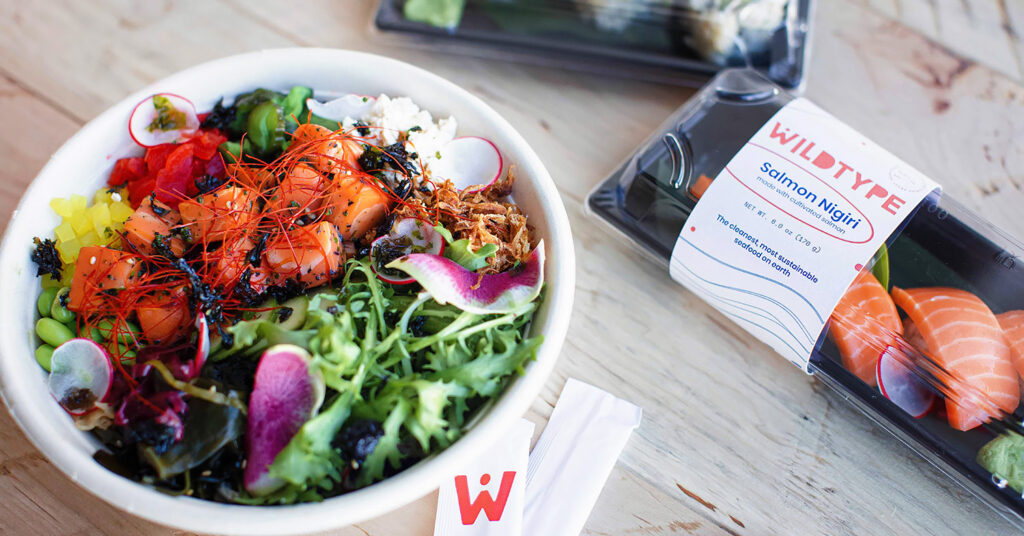If Seaspiracy amplified your ocean conservation concerns, but you don’t want to ditch spicy salmon maki rolls, cell-based (AKA cultivated, or lab-grown) meats may be the answer to your culinary hopes. Created in the lab, these new companies grow seafood in a brewery-like cellular agriculture system, eliminating the need for fishing or fish farming.
We’ve seen cell-based tuna, crab, shrimp, and even lobster, but San Francisco-based Wildtype is taking the first steps to bring sustainable cell-based salmon to U.S. grocery stores and restaurants, by entering into a partnership with fast-casual chain Pokéworks and sushi bar operator SNOWFOX.
“This is a significant milestone as we move closer to bringing our cultivated salmon to restaurants, grocery stores, and eventually kitchen tables across the U.S.,” Aryé Elfenbein, Wildtype’s co-founder and Chief Scientist, says.
The company chose salmon as its debut product due to its popularity and environmental status. “Salmon is the second most consumed seafood in the United States after shrimp, and is growing rapidly in popularity due to its excellent nutritional value, as well as broad culinary applications,” Wildtype co-founder Justin Kolbeck says. “It’s also badly overfished in the wild.”
Wildtype salmon contains an equal amount of omega-3 fatty acids to conventional salmon, without human health risks like mercury, microplastics, antibiotics, and other contaminants. It also tastes the same, Kolbeck says. “(Wildtype salmon) performs as well as conventional salmon in typical sushi applications, and we’re confident people will love it.”
When will Wildtype cultured salmon be available?
Wildtype is focusing on scaling production and preparing for its market launch, but no regulatory approval has yet been given for cell-based meats in the United States. (However, the USDA’s Food and Safety Inspection Service recently collected more than 1,000 comments on how cell-based meat should be labeled when approved.) So far, only Singapore is the only country in the world that allows the sale of cell-based meat.
As a result, Wildtype doesn’t have a firm launch date for its SNOWFOX and Pokéworks partnerships, but is consulting with the FDA. “We have been in close contact with FDA since 2019 and have been impressed by the Agency’s speed and thoughtfulness in approaching cellular agriculture,” Kolbeck says.
Though Wildtype’s FDA approval may be months—or even years—away, Kolbeck says that the future-oriented company wants to assure customers that the salmon will be widely accessible, including in grocery stores and restaurants that serve various price points. “While we can’t wait to announce our first fine dining restaurant partners, we want our future customers to know that accessibility is a critical part of our mission as a company,” Kolbeck says. “We will not have accomplished our vision for a cleaner, more sustainable seafood future if people can only buy Wildtype salmon at fancy restaurants. SNOWFOX and Pokéworks are critical partners in this strategy.”
Wildtype also said that its salmon will first purvey to fine dining restaurants, before heading to restaurant chains and grocery stores. Early next year, the company will announce its fine dining launch partnerships, following a trend of upscale chefs like Dominique Crenn, who will serve cell-based meats from Upside Foods at her restaurant Atelier Crenn.
The new partnerships were announced several months after the opening of Wildtype’s San Francisco salmon tasting room, where visitors are given a glimpse into the scientific process while tasting the salmon itself.
To make its cell-based fish, Wildtype grows living fish cells from Pacific salmon in bioreactors that look similar to fermentation tanks used to brew beer. The salmon cells are fed a specially-formulated mixture of proteins, sugars, fats, and minerals called the cell media, which partially determines what the final product tastes like. Workers then seed these cells into plant-based structures called scaffolds, where they grow into salmon cuts similar to the wild-caught variety.
Because of Wildtype’s partnerships, you may soon be able to have your omega 3-packed spicy salmon roll, and eat it too—without the worry of overfishing, including the plastic waste that comes from fishing nets.


